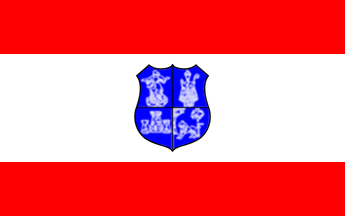
Last modified: 2015-01-17 by alex garofolo
Keywords: asunción | ciudad de asunción | distrito capital |
Links: FOTW homepage |
search |
disclaimer and copyright |
write us |
mirrors
 5:8
5:8Asunción, the capital city of the Republic of Paraguay, is located next to the Paraguay River. It was founded on August 15, 1537 by Captain Juan de Salazar y Espinoza, being one of the oldest cities in South America. It has more that 500,000 habitants (the most populated city in the country) and it is the most important port, economical and cultural center of Paraguay.
Francisco Gregoric, 20 May 2008
Flag Report [frp] published in July 2002 the flag of Asunción.
Later in 2005, this information was confirmed by Michel Lupant and published (September 2006)
in Franciae Vexilla [frv]
43/89. According to Michel Lupant the ratio of the flag he sees is
1:2 instead of 2:3.
Jaume Ollé, 24 Feb 2007
The flag of Asunción was adopted on December 11, 1961 by municipal decree No. 4635. and first raised on December 24, 1961.
According to the text of that legislation, the flag size is 1m wide by 1.60 m long. Therefore the official ratio of the flag is 5:8. We are bound to see flag with different proportions, but they are not official.
Each red stripe is 25 cm wide, and the central white stripe is 50 cm wide, which makes the field of the flag of three horizontal stripes of 1.2.1
The red color recalls the color of the field of the royal coat of arms of Spain that appeared in the traditional standard (banner) of the Cabildo (City Hall) of Asunción City in colonial times.
In the central white stripe the coat of arms of Asunción appears. Since the creation of the flag in 1961, the charges on the arms have experienced some changes in the way they are represented. The changes have been just details, but the same elements are always represented. These cosmetic changes were made in 1965, 1992 and 2001.
Francisco Gregoric, 20 May 2008
The present variant of the municipal coat of arms was established on December 12, 2001, by municipal decree No. 208. This legislation just changed minor details in the coat of arms. The basic elements are the traditional same ones that have appeared in Asunción City coats of arms.
The coat of arms of the city is quartered with the following elements:
Anything below this line was not added by the editor of this page.